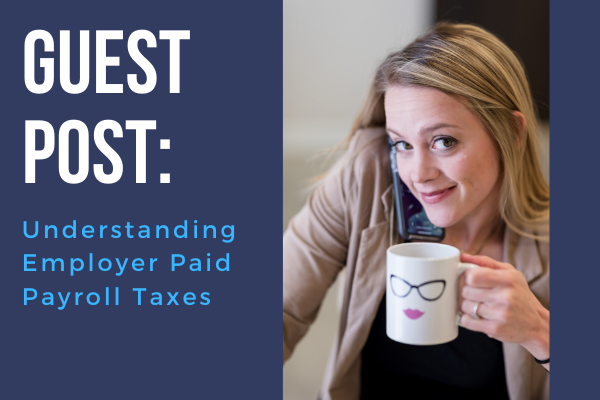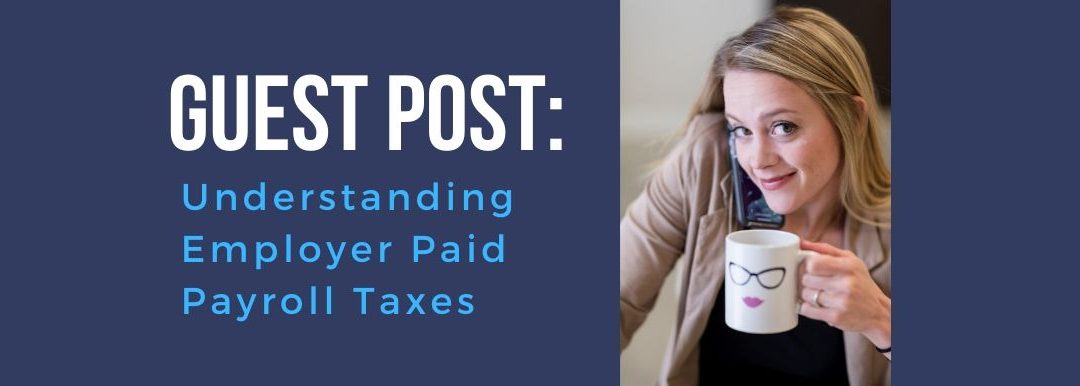This one little part of a 4 part series on my own blog, so if you want the rest of the info on hiring employees (Or to learn more about me) and setting up your payroll, head over to my blog!
Enjoy!
Employees can be expensive and you might wonder, “are they worth it!?”
Employers pay taxes for hiring employees but all the different kinds, federal and state, and acronyms can get confusing! It is very important that you understand what you’re paying, who you’re paying it to, and why!
Here is a little break down of the employer taxes you’ll be paying.
Friendly Reminder: Your tax accountant can help you understand employer taxes and break them down even more than this blog post! While I’m certainly not a CPA, my tax accountant definitely is! Tyler is my tax guy and he reviewed this post to make sure I wasn’t forgetting anything.
Don’t worry, we talk more about your tax accountant and what they can do to help your small business become an employer later on!
Taxes aren’t always sexy but it’s important that you understand them. Here is an in-depth overview of the taxes you’ll be paying for each employee;
Federal Unemployment Tax (FUTA): These are taxes you’ll have to pay quarterly if:
You paid wages of $1,500 or more to employees in any calendar quarter during the tax year.
You had one or more employees for at least some part of a day in any 20 or more different weeks in the calendar year. Count all full-time, part-time, and temporary employees. However, if your business is a partnership, don’t count its partners.
It can get kind of wonky to try and estimate your Federal Unemployment Tax liability because there’s this rate, but a credit, too. The good news is you’ll only pay taxes on the first $7,000 your employees earn. After you hit a Taxable Wage Base you will not pay taxes on those excess wages. The federal unemployment tax rate is currently set at 6%.
The standard rate is 6%, BUT employers can receive a credit when also paying state unemployment taxes (which are required, so this is the case 100% of the time in Tyler’s experience). This credit brings that rate down to an incredible 0.6% on wages up to $7,000. So the max the employer is ends up paying is $42 per year, per employee (rather than $420. Thank goodness!).
(You can read more on FUTA here)
State Unemployment Tax (SUTA): In the great state of North Dakota you are required to pay State Unemployment tax quarterly if:
Any employer with one or more workers during 20 different weeks in a calendar year or who has paid $1,500 or more in wages in a calendar quarter.
Any employer who acquires the business of another liable employer.
Any employer employing workers in North Dakota who is liable under the Federal Unemployment Tax Act (FUTA).
There are lots of different requirements for agriculture businesses, non-profits, and other business types. You can see those (for ND) here.
But basically…if you’re required to pay Federal Unemployment tax, you’re also required to pay state unemployment tax.
If you happen to own a business in another state (Thank you River Cities) or you have employees (or plan to have employees) who work in another state you will be subject to that state’s unemployment tax rate, or your tax accountant can help you determine where you owe unemployment taxes.
The amount that you owe for State Unemployment tax is up to your state agency, which in ND is ND Job Service. When employers become liable for unemployment insurance they are classified as “new employers” and Job Service will assign a sweet new employer rate. Tax rates are then re-determined for each calendar year based on the employer’s payroll history as of the preceding October.
*Takes Big Breath* Once you are no longer considered a ‘new employer’ your rate will be determined by your experience rate. Experience-rated employers are assigned rates based on their record of unemployment insurance taxes paid and benefits charged.
This essentially means if you have a lot of employees taking unemployment, you will have a higher rate.
Just the same as Federal Unemployment, there’s a taxable wage base limit. So you pay taxes on the first ~36,400 (For North Dakota). your employees earn. After you hit that Taxable Wage Base you won’t pay taxes on those excess wages. The limit is different in every state and in North Dakota, the limit is re-determined every year and is 70% of a statewide average wage.
FICA: Stands for Federal Income Contributions Act tax (FICA). These are the Social Security payments. These are split up between employee and employer. The rate is 12.4% (So the employee pays 6.2% and the employer pays 6.2%.) You will be responsible to pay Social Security tax on an employee’s wages until they reach the annual wage base limit, which for 2019 is $132,900.
Medicare: The Medicare taxes are also split evenly between employer and employee. The total rate is 2.9% (You guessed it, the employee pays 1.45% and you pay 1.45%). There is no annual wage base limit for medicare like there is for Social Security. In fact, if you happen to have employees making more than $200,000 in a year they may be subject to an additional 0.9% medical tax payment. Seems fair.
A good practice to determine what your tax liability could be is to use a payroll tax calculator. There are many user-friendly options –Here is one I have used. (For the North Dakota SUI rate you can estimate and use 2.5%, if you are a new employer it will likely be lower, maybe even around 1.5%. If you own a construction company, it will be much higher, around 9.5%.
This is because construction in ND is (generally) seasonal and Construction employers (generally) have a lot more unemployment claims. Don’t worry though, if you are a Construction Industry employer who doesn’t have a lot of UE claims, that will be reflected in your rate once you move to an Experience based rate! REMEMBER! These are estimates and subject to the state agency!)
Worker’s Compensation Insurance: You’ll also have to pay Worker’s Compensation Insurance.
Full Disclosure: This is not actually a Tax. BUT it IS an expense and process that new employers have to go through. So it is helpful to include it.
This is insurance you have to carry in case an employee gets injured on the job. You’ll have to get a quote from an Insurance Agent OR from your state provider if you operate in North Dakota, Washington, Ohio, Wyoming, Puerto Rico &/or the Virgin Islands.
If you operate in North Dakota just know that you’ll be assigned a fixed rate set by the state, and then you’ll submit payroll reports which determine your new rate based on the volume of payroll and type of work you do.
That’s a lot. But hopefully you don’t have any questions! In case you do – I know a couple of guys who can help! 😉
If you found this article valuable and you want more HR and Marketing advice, you can click here to to subscribe to my e-mail list!
Thanks for having me, guys!

Experience & Expertise
Helping you protect what is most important to you is another way that our firm is here
to serve you and is always on target.

